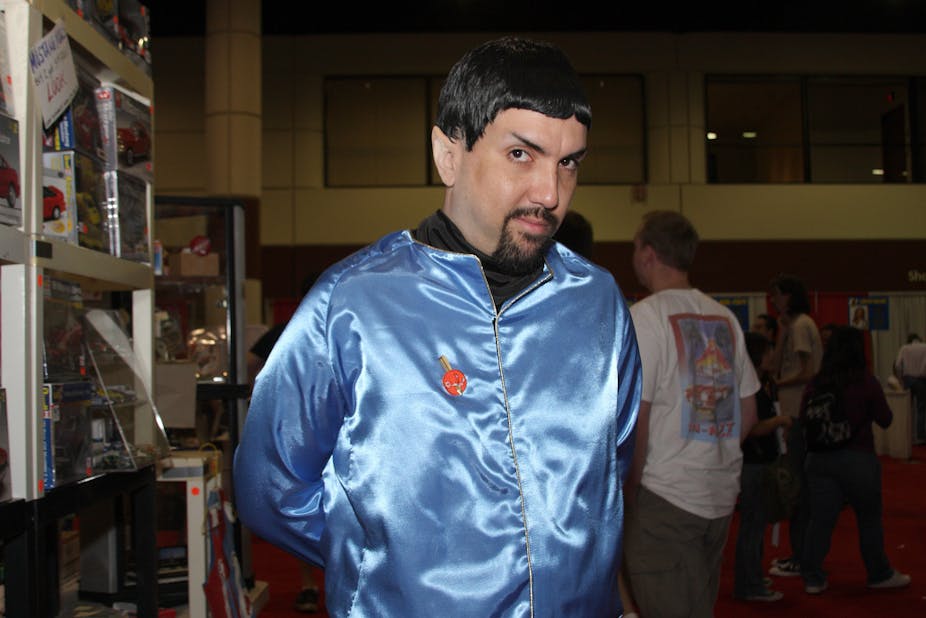The world said goodbye to Leonard Nimoy last week, and for those who identify as serious fans of Star Trek, the loss felt unexpectedly personal. Once the news hit, social media feeds exploded with an outpouring of grief.
NASA tweeted, “Many of us at NASA inspired by Star Trek. Boldly go….” President Obama posted “Long before being nerdy was cool, there was Leonard Nimoy…I loved Spock.” Nimoy’s last tweet, which ended with “LLAP” (Spock’s signature “live long and prosper”) was re-tweeted more than 275,000 times.
The emotional reaction may be difficult to understand for someone who doesn’t identify as a fan. Fans who had never met Nimoy, who weren’t even born when the original Star Trek aired on the (tiny) television screens of 1966, nevertheless felt the void of his passing. Star Trek was so pivotal to the beginnings of what we now call “fandom” that it’s hard to quantify the depth of his contribution.
The term fandom refers to a community of people who are passionate about something, whether it’s a film, a band, a television show, a book or a sports team. They’re fans who don’t just casually watch an episode when they happen to be home, but who set up their DVRs, watch a show live – and then go on to buy the show’s DVD sets. They’re fans who are so inspired by a film’s characters that they want to share their passion with others, whether it’s through writing fan fiction, creating fan art, or saving up to attend a fan convention.
For many, Star Trek was their gateway to fandom. It was the one show my little brother and I were allowed to stay up late to watch, and I was instantly fascinated by Mr. Spock (my brother, on the other hand, wanted to be Captain Kirk). Much later, my own children and I crowded around a (much larger) television set to watch Star Trek: The Next Generation.

Today, fan conventions are ubiquitous with franchises like Comic Con and Creation Entertainment. Yet the very first fan conventions were for Star Trek, and brought the show’s actors face to face with the passionate viewers whose letter writing campaigns had kept their struggling show on the air. Those early attempts to influence network decisions were the predecessor to every campaign launched to save a floundering show, whether it was Jericho or Arrested Development.

I began researching fandom after fellow professor Kathy Larson and I unexpectedly fell head over heels for the television show Supernatural. Was it okay, we wondered, for two grown women with kids and careers to be so passionate about a television show? We decided to investigate the phenomenon, a journey that took us from coast to coast, from conventions and film sets to fan gatherings at local Starbucks. Eventually, we wrote a book: Fangasm. It turns out that being a fan – in the fandom sense – is about more than having a fondness for a television show, film, book or band. It’s about finding a group of like-minded people who love the same thing you do – a community that allows you to be yourself. For some, it’s the first time they’ve felt like they’ve belonged to anything.
A recent Facebook post by Star Trek fan Dawn Swingle captured Nimoy’s profound impact:
Like so many SciFi fans, I was the kid who didn’t fit in growing up…I could identify with Mr. Spock, who was the alien, but who was also a part of the Enterprise crew…Spock showed me that it was okay to be a nerd, that even in the future not everyone fit in, or needed to; and finally, that I wasn’t alone in feeling like an outsider…Soon after, I started finding others who shared my passion.
News coverage of conventions like Comic Con tend to lean toward the sensational – fans dressed as scantily-clad Princess Leias, or as Klingons who actually speak Klingon. But the creative costumes are only part of the story. While researching Fangasm, we attended a Star Trek convention in Las Vegas. As we interviewed fan after fan, a theme emerged: family. Sometimes it was expressed literally (grandparents in cosplay pushing their grandchildren in strollers); other times, it existed figuratively – fans who found their best friends, their professions and their inspiration in shows like Star Trek.
So it’s no surprise that for many fans, the loss of Leonard Nimoy felt like the loss of a family member. Nimoy was happy to be known as the “geek grandpa,” and embraced his key role in history and development of fandom. Those early fans – who, so many years ago, fell in love with Kirk and Spock – proved that their passion could make a difference, that fan communities could be a force for good.
They took a page out of Star Trek and refused to apologize for being different. Just like Mr. Spock.


